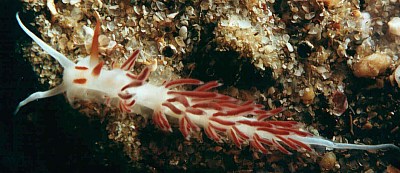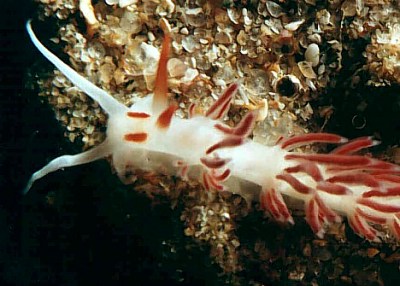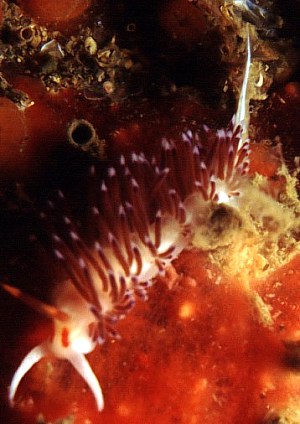

Cratena? sp. 1
Order: NUDIBRANCHIA
Suborder: AEOLIDINA
Family: Glaucidae
PHOTO
Umzumbe, south coast of KwaZulu-Natal SOUTH AFRICA. 28 May 2000, 35mm. Photo: Valda Fraser.
• See Valda Fraser's message below.
• Possibly Cratena sp. 2 (Gosliner, 1987) - see message below.
Rudman, W.B., 2000 (July 26) Cratena? sp. 1 [In] Sea Slug Forum. Australian Museum, Sydney. Available from http://www.seaslugforum.net/find/cratsp1
Related messages
Cratena sp. from Durban, South Africa
June 7, 2001
From: Kirsty Miller

Dear Bill,
I found this nudibranch on a wreck off Durban, South Africa at a depth of Depth 22 m. The size of the nudibranch is 2.5 cm. I think the family is Facelinidae. Could you please help me with an ID
Thanks
Kirsty Miller
divegirl@xsinet.co.za
Miller, K., 2001 (Jun 7) Cratena sp. from Durban, South Africa. [Message in] Sea Slug Forum. Australian Museum, Sydney. Available from http://www.seaslugforum.net/find/4497Dear Kirsty,
My first thought was that this was Cratena capensis Barnard 1927 but on a closer look at your photo it seems to be the species which is called Cratena sp. 1 in both Terry Gosliner's book and the Forum. Whereas Cratena capensis has angular foot corners, this animal has more elongate tentacular foot corners. Terry also notes that C. capensis appears to be endemic to the Cape Province, [that is it is only found there], while your animal came from Durban, considerably further north. Yur animal also has quite long rhinophores and a dark spot in the ceratal figestive gland just below the tip, both characters noted by Gosliner as charcteristic of Cratena sp. 1. If you have other photos showing the head and anterior foot more clearly they could be useful, but I think this is Gosliner's Cratena sp. 1
Best wishes,
Bill Rudman
Re: Cratena sp. 1 from South Africa
July 28, 2000
From: Terry Gosliner
Dear Bill,
It was great to see Valda's photo of the Cratena from South Africa. It is clearly distinct from Cratena capensis for the reasons you noted. C. capensis does indeed have angular rather than tentacular foot corners. It looks more like Cratena sp. 2 in my South African book.
Unfortunately that was based on a single somewhat damaged specimen. Also the photo was not great. It is clearly not any of the described species.
All the best,
Terry.
tgosline@calacademy.org
Gosliner, T., 2000 (Jul 28) Re: Cratena sp. 1 from South Africa. [Message in] Sea Slug Forum. Australian Museum, Sydney. Available from http://www.seaslugforum.net/find/2784Thanks Terry,
Bill Rudman.
Cratena capensis? from South Africa
July 27, 2000
From: Valda Fraser


Dear Bill
Another one to add to the "Cratena confusion." I hope you will be able to come up with something.
Locality: Umzumbe, south coast of KwaZulu-Natal SOUTH AFRICA
Date: 28 May 2000
Size: 35mm
Regards
Valda Fraser
iti04937@mweb.co.za
Fraser, V., 2000 (Jul 27) Cratena capensis? from South Africa. [Message in] Sea Slug Forum. Australian Museum, Sydney. Available from http://www.seaslugforum.net/find/2480Dear Valda,
I would very much like Terry Gosliner's comments on this animal. In his book the animal he identifies as Cratena capensis Barnard, 1927 has quite distinctive pigmented white caps to the cerata, while your animal just has the translucent white of the cnidosac. Both your animal and his have red spots on the head, but the rhinophores in his C. capensis are proportionally much smaller. He notes that C. capensis has angular rather than tentacular foot corners, but I can't clearly see that in his book.
Your animal looks quite like Gosliner's Cratena sp. 1 which he says differs in having proportionally larger rhinophores, cerata and oral tentacles, which is the case in your photo. Your animal also has tentacular foot corners but I am not sure whether Gosliner's Cratena sp. 1 has red spots on the head.
I realise you may not know what a foot corner is. It is the name we give to the corners of the anterior edge of the foot. In some species these corners are rounded, while at the other extreme they are developed into quite long tapering tentacles. It is definitely worth noting the presence of foot corners, and getting them in a photo if possible, because often after prservation they contract or disappear.
I'm afraid this doesn't solve your Cratena problem, but it would be boring if we knew it all. As this is the first unknown Cratena-like aeolid I have on the Forum, I will, like Terry Gosliner, temporarily call it Cratena sp. 1.
Best wishes,
Bill Rudman.
